Deck 9: Systems of Equations and Inequalities
Question
Question
Question
Question
Question
Question
Question
Question
Question
Question
Question
Question
Question
Question
Question
Question
Question
Question
Question
Question
Question
Question
Question
Question
Question
Question
Question
Question
Question
Question
Question
Question
Question
Question
Question
Question
Question
Question
Question
Question
Question
Question
Question
Question
Question
Question
Question
Question
Question
Question
Question
Question
Question
Question
Question
Question
Question
Question
Question
Question
Question
Question
Question
Question
Question
Question
Question
Question
Question
Question
Question
Question
Question
Question
Question
Question
Question
Question
Question
Question

Unlock Deck
Sign up to unlock the cards in this deck!
Unlock Deck
Unlock Deck
1/147
Play
Full screen (f)
Deck 9: Systems of Equations and Inequalities
1
Use the method of substitution to solve the system. 
A)
B)
C)
D)
E)no solution

A)

B)

C)

D)

E)no solution

2
A stationary company makes two types of notebooks: a deluxe notebook with subject dividers, which sells for $1.1, and a regular notebook, which sells for $0.85. The production cost is $1.00 for each deluxe notebook and $0.75 for each regular notebook. The company has the facilities to manufacture between 2,000 and 3,000 deluxe and between 3,000 and 6,000 regular notebooks, but not more than 7,000 altogether. How many notebooks of each type should be manufactured to maximize the difference between the selling prices and the production cost?
A)2,000 deluxe and 5,000 regular
B)3,000 deluxe and 4,000 regular
C)2,300 deluxe and 4,000 regular
D)2,500 deluxe and 4,000 regular
E)3,000 deluxe and 5,000 regular
A)2,000 deluxe and 5,000 regular
B)3,000 deluxe and 4,000 regular
C)2,300 deluxe and 4,000 regular
D)2,500 deluxe and 4,000 regular
E)3,000 deluxe and 5,000 regular
3,000 deluxe and 4,000 regular
3
Solve the system  using the inverse method.
using the inverse method.
A)
B)
C)
D)The system is inconsistent
E)The equations are dependent
 using the inverse method.
using the inverse method.A)

B)

C)

D)The system is inconsistent
E)The equations are dependent

4
Solve the system. 
A)
B)
C)
D)
E)

A)

B)

C)

D)

E)


Unlock Deck
Unlock for access to all 147 flashcards in this deck.
Unlock Deck
k this deck
5
Solve the system  using the inverse method.
using the inverse method.
A)
B)
C)
D)The system is inconsistent
E)The equations are dependent
 using the inverse method.
using the inverse method.A)

B)

C)

D)The system is inconsistent
E)The equations are dependent

Unlock Deck
Unlock for access to all 147 flashcards in this deck.
Unlock Deck
k this deck
6
Find the inverse of the matrix if it exists. 
A)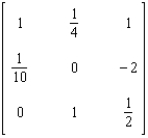
B)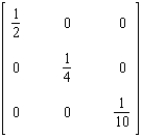
C)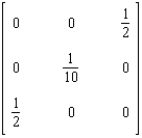
D)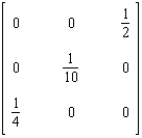
E)Does not exist

A)

B)

C)

D)

E)Does not exist

Unlock Deck
Unlock for access to all 147 flashcards in this deck.
Unlock Deck
k this deck
7
A manufacturer of cell phones makes a profit of $23 on a deluxe model and $31 on a standard model. The company wishes to produce at least 80 deluxe models and at least 100 standard models per day. To maintain high quality, the daily production should not exceed 240 phones. How many of each type should be produced daily in order to maximize the profit?
A)31 standard and 80 deluxe
B)80 standard and 160 deluxe
C)160 standard and 80 deluxe
D)200 standard and 40 deluxe
E)160 standard and 60 deluxe
A)31 standard and 80 deluxe
B)80 standard and 160 deluxe
C)160 standard and 80 deluxe
D)200 standard and 40 deluxe
E)160 standard and 60 deluxe

Unlock Deck
Unlock for access to all 147 flashcards in this deck.
Unlock Deck
k this deck
8
Sketch the region R determined by the given constraints, and label its vertices. Find the maximum value of C on R. 



A)maximum of 20 at
B)maximum of 24 at
C)maximum of 0 at
D)maximum of 22 at
E)maximum of 18 at




A)maximum of 20 at

B)maximum of 24 at

C)maximum of 0 at

D)maximum of 22 at

E)maximum of 18 at


Unlock Deck
Unlock for access to all 147 flashcards in this deck.
Unlock Deck
k this deck
9
Use the method of substitution to solve the system. 
A)
B)
C)
D)
E)no solution

A)

B)

C)

D)

E)no solution

Unlock Deck
Unlock for access to all 147 flashcards in this deck.
Unlock Deck
k this deck
10
Find a system of inequalities for the graph shown. 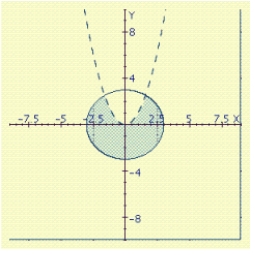
A)
B)
C)
D)
E)

A)

B)

C)

D)

E)


Unlock Deck
Unlock for access to all 147 flashcards in this deck.
Unlock Deck
k this deck
11
Use matrices to solve the system. 
A)
B)
C)
D)The system is dependent
E)No solution

A)

B)

C)

D)The system is dependent
E)No solution

Unlock Deck
Unlock for access to all 147 flashcards in this deck.
Unlock Deck
k this deck
12
Solve the system using the inverse method. 
A)
B)
C)
D)The system is inconsistent.
E)The equations are dependent.

A)

B)

C)

D)The system is inconsistent.
E)The equations are dependent.

Unlock Deck
Unlock for access to all 147 flashcards in this deck.
Unlock Deck
k this deck
13
Use the method of substitution to solve the system. 
A)( - 4, -21 )
B)( - 4, -21 ), ( 9, 44 )
C)( - 4, -21 ), ( 8, 44 )
D)( 9, 44 )
E)no solution

A)( - 4, -21 )
B)( - 4, -21 ), ( 9, 44 )
C)( - 4, -21 ), ( 8, 44 )
D)( 9, 44 )
E)no solution

Unlock Deck
Unlock for access to all 147 flashcards in this deck.
Unlock Deck
k this deck
14
Use matrices to solve the system. 
A)
B)
C)
D)The equations are dependent
E)No solution

A)

B)

C)

D)The equations are dependent
E)No solution

Unlock Deck
Unlock for access to all 147 flashcards in this deck.
Unlock Deck
k this deck
15
Solve the system  using the inverse method.
using the inverse method.
A)
B)
C)
D)The system is inconsistent
E)The equations are dependent
 using the inverse method.
using the inverse method.A)

B)

C)

D)The system is inconsistent
E)The equations are dependent

Unlock Deck
Unlock for access to all 147 flashcards in this deck.
Unlock Deck
k this deck
16
A small firm manufactures bookshelves and desks for microcomputers. For each product it is necessary to use a table saw and a power router. To manufacture each bookshelf, the saw must be used for  hour and the router for 1 hour. A desk requires the use of each machine for 2 hours. The profits are $20 per bookshelf and $50 per desk. If the saw can be used for 8 hours per day and the router for 12 hours per day, how many bookshelves and desks should be manufactured each day to maximize the profit?
hour and the router for 1 hour. A desk requires the use of each machine for 2 hours. The profits are $20 per bookshelf and $50 per desk. If the saw can be used for 8 hours per day and the router for 12 hours per day, how many bookshelves and desks should be manufactured each day to maximize the profit?
A)4 bookshelves and 2 desks
B)2 bookshelves and 2 desks
C)2 bookshelves and 4 desks
D)0 bookshelves and 4 desks
E)2 bookshelves and 0 desks
 hour and the router for 1 hour. A desk requires the use of each machine for 2 hours. The profits are $20 per bookshelf and $50 per desk. If the saw can be used for 8 hours per day and the router for 12 hours per day, how many bookshelves and desks should be manufactured each day to maximize the profit?
hour and the router for 1 hour. A desk requires the use of each machine for 2 hours. The profits are $20 per bookshelf and $50 per desk. If the saw can be used for 8 hours per day and the router for 12 hours per day, how many bookshelves and desks should be manufactured each day to maximize the profit?A)4 bookshelves and 2 desks
B)2 bookshelves and 2 desks
C)2 bookshelves and 4 desks
D)0 bookshelves and 4 desks
E)2 bookshelves and 0 desks

Unlock Deck
Unlock for access to all 147 flashcards in this deck.
Unlock Deck
k this deck
17
Find the inverse of the matrix if it exists. 
A)
B)
C)
D)
E)Does not exist

A)

B)

C)

D)

E)Does not exist

Unlock Deck
Unlock for access to all 147 flashcards in this deck.
Unlock Deck
k this deck
18
Find the inverse of the matrix if it exists. 
A)
B)
C)
D)
E)Does not exist

A)

B)

C)

D)

E)Does not exist

Unlock Deck
Unlock for access to all 147 flashcards in this deck.
Unlock Deck
k this deck
19
Three average monthly low temperatures for Detroit are listed in the table. 
Let correspond to January,
correspond to January,  to February, . . . , and
to February, . . . , and  to December. Determine a quadratic function
to December. Determine a quadratic function  that interpolates the data - that is, determine the constants a, b, and c such that
that interpolates the data - that is, determine the constants a, b, and c such that  , and
, and  .
.
A)
B)
C)
D)
E)

Let
 correspond to January,
correspond to January,  to February, . . . , and
to February, . . . , and  to December. Determine a quadratic function
to December. Determine a quadratic function  that interpolates the data - that is, determine the constants a, b, and c such that
that interpolates the data - that is, determine the constants a, b, and c such that  , and
, and  .
.A)

B)

C)

D)

E)


Unlock Deck
Unlock for access to all 147 flashcards in this deck.
Unlock Deck
k this deck
20
Use the method of substitution to solve the system. 
A)( 0, 2 )
B)( 4, 0 )
C)( 4, 0 ), ( 0, 2 )
D)( 4, 1 ), ( 0, 2 )
E)no solution

A)( 0, 2 )
B)( 4, 0 )
C)( 4, 0 ), ( 0, 2 )
D)( 4, 1 ), ( 0, 2 )
E)no solution

Unlock Deck
Unlock for access to all 147 flashcards in this deck.
Unlock Deck
k this deck
21
Use the method of substitution to solve the system. 
A)( - 7, -18 )
B)( 9, 14 )
C)( - 7, -18 ), ( 9, 14 )
D)( - 7, -18 ), ( 8, 14 )
E)no solution

A)( - 7, -18 )
B)( 9, 14 )
C)( - 7, -18 ), ( 9, 14 )
D)( - 7, -18 ), ( 8, 14 )
E)no solution

Unlock Deck
Unlock for access to all 147 flashcards in this deck.
Unlock Deck
k this deck
22
A small firm manufactures bookshelves and desks for microcomputers. For each product it is necessary to use a table saw and a power router. To manufacture each bookshelf, the saw must be used for  hour and the router for 1 hour. A desk requires the use of each machine for 2 hours. The profits are $20 per bookshelf and $50 per desk. If the saw can be used for 8 hours per day and the router for 12 hours per day, how many bookshelves and desks should be manufactured each day to maximize the profit?
hour and the router for 1 hour. A desk requires the use of each machine for 2 hours. The profits are $20 per bookshelf and $50 per desk. If the saw can be used for 8 hours per day and the router for 12 hours per day, how many bookshelves and desks should be manufactured each day to maximize the profit?
A)8 bookshelves and 8 desks
B)0 bookshelves and 1 desks
C)8 bookshelves and 0 desks
D)8 bookshelves and 1 desks
E)1 bookshelves and 8 desks
 hour and the router for 1 hour. A desk requires the use of each machine for 2 hours. The profits are $20 per bookshelf and $50 per desk. If the saw can be used for 8 hours per day and the router for 12 hours per day, how many bookshelves and desks should be manufactured each day to maximize the profit?
hour and the router for 1 hour. A desk requires the use of each machine for 2 hours. The profits are $20 per bookshelf and $50 per desk. If the saw can be used for 8 hours per day and the router for 12 hours per day, how many bookshelves and desks should be manufactured each day to maximize the profit?A)8 bookshelves and 8 desks
B)0 bookshelves and 1 desks
C)8 bookshelves and 0 desks
D)8 bookshelves and 1 desks
E)1 bookshelves and 8 desks

Unlock Deck
Unlock for access to all 147 flashcards in this deck.
Unlock Deck
k this deck
23
Use Cramer's rule, whenever possible, to solve the system. 
A)
B)
C)
D)The equations are dependent.
E)The system is inconsistent.

A)

B)

C)

D)The equations are dependent.
E)The system is inconsistent.

Unlock Deck
Unlock for access to all 147 flashcards in this deck.
Unlock Deck
k this deck
24
Use matrices to solve the system. 
A)
B)
C)
D)The system is dependent
E)No solution

A)

B)

C)

D)The system is dependent
E)No solution

Unlock Deck
Unlock for access to all 147 flashcards in this deck.
Unlock Deck
k this deck
25
Find the inverse of the matrix if it exists. 
A)
B)
C)
D)
E)Does not exist

A)

B)

C)

D)

E)Does not exist

Unlock Deck
Unlock for access to all 147 flashcards in this deck.
Unlock Deck
k this deck
26
Solve the system  using the inverse method.
using the inverse method.
A)
B)
C)
D)The system is inconsistent
E)The equations are dependent
 using the inverse method.
using the inverse method.A)

B)

C)

D)The system is inconsistent
E)The equations are dependent

Unlock Deck
Unlock for access to all 147 flashcards in this deck.
Unlock Deck
k this deck
27
A stationary company makes two types of notebooks: a deluxe notebook with subject dividers, which sells for $1.25, and a regular notebook, which sells for $0.9. The production cost is $1.00 for each deluxe notebook and $0.75 for each regular notebook. The company has the facilities to manufacture between 2,000 and 3,000 deluxe and between 3,000 and 6,000 regular notebooks, but not more than 8,000 altogether. How many notebooks of each type should be manufactured to maximize the difference between the selling prices and the production cost?
A)2,500 deluxe and 5,000 regular
B)2,000 deluxe and 6,000 regular
C)2,300 deluxe and 5,000 regular
D)3,000 deluxe and 5,000 regular
E)3,000 deluxe and 6,000 regular
A)2,500 deluxe and 5,000 regular
B)2,000 deluxe and 6,000 regular
C)2,300 deluxe and 5,000 regular
D)3,000 deluxe and 5,000 regular
E)3,000 deluxe and 6,000 regular

Unlock Deck
Unlock for access to all 147 flashcards in this deck.
Unlock Deck
k this deck
28
Find the determinant of the matrix. 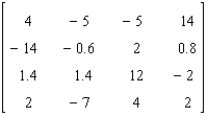
A)15,232.88
B)3,046.58
C)22,849.32
D)7,616.44
E)30,465.76

A)15,232.88
B)3,046.58
C)22,849.32
D)7,616.44
E)30,465.76

Unlock Deck
Unlock for access to all 147 flashcards in this deck.
Unlock Deck
k this deck
29
Use the method of substitution to solve the system. 
A)
B)
C)
D)
E)no solution

A)

B)

C)

D)

E)no solution

Unlock Deck
Unlock for access to all 147 flashcards in this deck.
Unlock Deck
k this deck
30
Find the determinant. 
A)
B)
C)
D)
E)

A)

B)

C)

D)

E)


Unlock Deck
Unlock for access to all 147 flashcards in this deck.
Unlock Deck
k this deck
31
A manufacturer of cell phones makes a profit of $26 on a deluxe model and $30 on a standard model. The company wishes to produce at least 80 deluxe models and at least 100 standard models per day. To maintain high quality, the daily production should not exceed 240 phones. How many of each type should be produced daily in order to maximize the profit?
A)160 standard and 60 deluxe
B)30 standard and 80 deluxe
C)80 standard and 160 deluxe
D)200 standard and 40 deluxe
E)160 standard and 80 deluxe
A)160 standard and 60 deluxe
B)30 standard and 80 deluxe
C)80 standard and 160 deluxe
D)200 standard and 40 deluxe
E)160 standard and 80 deluxe

Unlock Deck
Unlock for access to all 147 flashcards in this deck.
Unlock Deck
k this deck
32
Let  be the identity matrix of order 2, and let
be the identity matrix of order 2, and let  . Find the polynomial
. Find the polynomial  for the given matrix A. (In the study of matrices,
for the given matrix A. (In the study of matrices,  is the characteristic polynomial of A, and the zeros of
is the characteristic polynomial of A, and the zeros of  are the characteristic values (eigenvalues) of A.)
are the characteristic values (eigenvalues) of A.) 
A)
B)
C)
D)
E)
 be the identity matrix of order 2, and let
be the identity matrix of order 2, and let  . Find the polynomial
. Find the polynomial  for the given matrix A. (In the study of matrices,
for the given matrix A. (In the study of matrices,  is the characteristic polynomial of A, and the zeros of
is the characteristic polynomial of A, and the zeros of  are the characteristic values (eigenvalues) of A.)
are the characteristic values (eigenvalues) of A.) 
A)

B)

C)

D)

E)


Unlock Deck
Unlock for access to all 147 flashcards in this deck.
Unlock Deck
k this deck
33
Use matrices to solve the system. 
A)
B)
C)
D)The equations are dependent
E)No solution

A)

B)

C)

D)The equations are dependent
E)No solution

Unlock Deck
Unlock for access to all 147 flashcards in this deck.
Unlock Deck
k this deck
34
Find a system of inequalities for the graph shown. 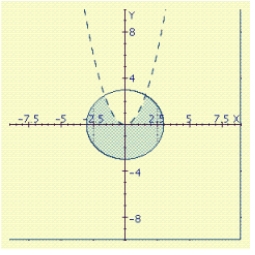
A)
B)
C)
D)
E)

A)

B)

C)

D)

E)


Unlock Deck
Unlock for access to all 147 flashcards in this deck.
Unlock Deck
k this deck
35
Sketch the region R determined by the given constraints, and label its vertices. Find the maximum value of C on R. 



A)maximum of 44 at
B)maximum of 40 at
C)maximum of 42 at
D)maximum of 46 at
E)maximum of 0 at




A)maximum of 44 at

B)maximum of 40 at

C)maximum of 42 at

D)maximum of 46 at

E)maximum of 0 at


Unlock Deck
Unlock for access to all 147 flashcards in this deck.
Unlock Deck
k this deck
36
Solve the system. 
A)
B)
C)
D)
E)

A)

B)

C)

D)

E)


Unlock Deck
Unlock for access to all 147 flashcards in this deck.
Unlock Deck
k this deck
37
Find the inverse of the matrix if it exists. 
A)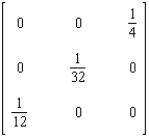
B)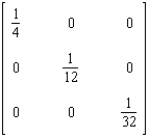
C)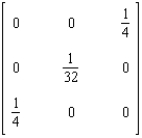
D)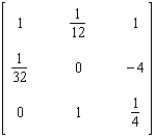
E)Does not exist

A)

B)

C)

D)

E)Does not exist

Unlock Deck
Unlock for access to all 147 flashcards in this deck.
Unlock Deck
k this deck
38
Use the method of substitution to solve the system. 
A)( 4, 0 ), ( -32, 6 )
B)( -32, 6 )
C)( 4, 1 ), ( -32, 6 )
D)( 4, 0 )
E)no solution

A)( 4, 0 ), ( -32, 6 )
B)( -32, 6 )
C)( 4, 1 ), ( -32, 6 )
D)( 4, 0 )
E)no solution

Unlock Deck
Unlock for access to all 147 flashcards in this deck.
Unlock Deck
k this deck
39
Use the method of substitution to solve the system. 
A)
B)
C)
D)
E)no solution

A)

B)

C)

D)

E)no solution

Unlock Deck
Unlock for access to all 147 flashcards in this deck.
Unlock Deck
k this deck
40
Find the inverse of the matrix if it exists. 
A)
B)
C)
D)
E)Does not exist

A)

B)

C)

D)

E)Does not exist

Unlock Deck
Unlock for access to all 147 flashcards in this deck.
Unlock Deck
k this deck
41
Let  be the identity matrix of order 2, and let
be the identity matrix of order 2, and let  . Find the polynomial
. Find the polynomial  for the given matrix A. (In the study of matrices,
for the given matrix A. (In the study of matrices,  is the characteristic polynomial of A, and the zeros of
is the characteristic polynomial of A, and the zeros of  are the characteristic values (eigenvalues) of A.)
are the characteristic values (eigenvalues) of A.) 
A)
B)
C)
D)
E)
 be the identity matrix of order 2, and let
be the identity matrix of order 2, and let  . Find the polynomial
. Find the polynomial  for the given matrix A. (In the study of matrices,
for the given matrix A. (In the study of matrices,  is the characteristic polynomial of A, and the zeros of
is the characteristic polynomial of A, and the zeros of  are the characteristic values (eigenvalues) of A.)
are the characteristic values (eigenvalues) of A.) 
A)

B)

C)

D)

E)


Unlock Deck
Unlock for access to all 147 flashcards in this deck.
Unlock Deck
k this deck
42
Sketch the region R determined by the given constraints, and label its vertices. Find the maximum value of C on R. 



A)maximum of 12 at
B)maximum of 14 at
C)maximum of 16 at
D)maximum of 0 at
E)maximum of 18 at




A)maximum of 12 at

B)maximum of 14 at

C)maximum of 16 at

D)maximum of 0 at

E)maximum of 18 at


Unlock Deck
Unlock for access to all 147 flashcards in this deck.
Unlock Deck
k this deck
43
Solve the system using the inverse method. 
A)
B)
C)
D)The system is inconsistent.
E)The equations are dependent.

A)

B)

C)

D)The system is inconsistent.
E)The equations are dependent.

Unlock Deck
Unlock for access to all 147 flashcards in this deck.
Unlock Deck
k this deck
44
Use matrices to solve the system. 
A)
B)
C)
D)The equations are dependent
E)No solution

A)

B)

C)

D)The equations are dependent
E)No solution

Unlock Deck
Unlock for access to all 147 flashcards in this deck.
Unlock Deck
k this deck
45
Solve the system  using the inverse method.
using the inverse method.
A)
B)
C)
D)The system is inconsistent
E)The equations are dependent
 using the inverse method.
using the inverse method.A)

B)

C)

D)The system is inconsistent
E)The equations are dependent

Unlock Deck
Unlock for access to all 147 flashcards in this deck.
Unlock Deck
k this deck
46
Use Cramer's rule, whenever possible, to solve the system. 
A)
B)
C)
D)The equations are dependent.
E)The system is inconsistent.

A)

B)

C)

D)The equations are dependent.
E)The system is inconsistent.

Unlock Deck
Unlock for access to all 147 flashcards in this deck.
Unlock Deck
k this deck
47
Solve the system. 
A)
B)
C)
D)
E)

A)

B)

C)

D)

E)


Unlock Deck
Unlock for access to all 147 flashcards in this deck.
Unlock Deck
k this deck
48
Use matrices to solve the system. 
A)
B)
C)
D)The system is dependent
E)No solution

A)

B)

C)

D)The system is dependent
E)No solution

Unlock Deck
Unlock for access to all 147 flashcards in this deck.
Unlock Deck
k this deck
49
Use the method of substitution to solve the system. 
A)
B)
C)
D)
E)no solution

A)

B)

C)

D)

E)no solution

Unlock Deck
Unlock for access to all 147 flashcards in this deck.
Unlock Deck
k this deck
50
A stationary company makes two types of notebooks: a deluxe notebook with subject dividers, which sells for $1.2, and a regular notebook, which sells for $0.85. The production cost is $1.00 for each deluxe notebook and $0.75 for each regular notebook. The company has the facilities to manufacture between 2,000 and 3,000 deluxe and between 3,000 and 6,000 regular notebooks, but not more than 8,000 altogether. How many notebooks of each type should be manufactured to maximize the difference between the selling prices and the production cost?
A)2,300 deluxe and 5,000 regular
B)3,000 deluxe and 6,000 regular
C)2,000 deluxe and 6,000 regular
D)3,000 deluxe and 5,000 regular
E)2,500 deluxe and 5,000 regular
A)2,300 deluxe and 5,000 regular
B)3,000 deluxe and 6,000 regular
C)2,000 deluxe and 6,000 regular
D)3,000 deluxe and 5,000 regular
E)2,500 deluxe and 5,000 regular

Unlock Deck
Unlock for access to all 147 flashcards in this deck.
Unlock Deck
k this deck
51
Solve the system  using the inverse method.
using the inverse method.
A)
B)
C)
D)The system is inconsistent
E)The equations are dependent
 using the inverse method.
using the inverse method.A)

B)

C)

D)The system is inconsistent
E)The equations are dependent

Unlock Deck
Unlock for access to all 147 flashcards in this deck.
Unlock Deck
k this deck
52
Three average monthly low temperatures for Detroit are listed in the table. 
Let correspond to January,
correspond to January,  to February, . . . , and
to February, . . . , and  to December. Determine a quadratic function
to December. Determine a quadratic function  that interpolates the data - that is, determine the constants a, b, and c such that
that interpolates the data - that is, determine the constants a, b, and c such that  , and
, and  .
.
A)
B)
C)
D)
E)

Let
 correspond to January,
correspond to January,  to February, . . . , and
to February, . . . , and  to December. Determine a quadratic function
to December. Determine a quadratic function  that interpolates the data - that is, determine the constants a, b, and c such that
that interpolates the data - that is, determine the constants a, b, and c such that  , and
, and  .
.A)

B)

C)

D)

E)


Unlock Deck
Unlock for access to all 147 flashcards in this deck.
Unlock Deck
k this deck
53
Use the method of substitution to solve the system. 
A)( - 3, -16 )
B)( - 3, -16 ), ( 6, 11 )
C)( 6, 11 )
D)( - 3, -16 ), ( 5, 11 )
E)no solution

A)( - 3, -16 )
B)( - 3, -16 ), ( 6, 11 )
C)( 6, 11 )
D)( - 3, -16 ), ( 5, 11 )
E)no solution

Unlock Deck
Unlock for access to all 147 flashcards in this deck.
Unlock Deck
k this deck
54
Use the method of substitution to solve the system. 
A)( 7, 0 ), ( 3, 2 )
B)( 7, 0 )
C)( 3, 2 )
D)( 7, 1 ), ( 3, 2 )
E)no solution

A)( 7, 0 ), ( 3, 2 )
B)( 7, 0 )
C)( 3, 2 )
D)( 7, 1 ), ( 3, 2 )
E)no solution

Unlock Deck
Unlock for access to all 147 flashcards in this deck.
Unlock Deck
k this deck
55
Find the determinant of the matrix. 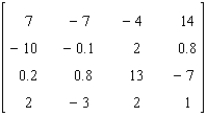
A)1,616.95
B)4,850.85
C)3,233.9
D)6,467.8
E)461.99

A)1,616.95
B)4,850.85
C)3,233.9
D)6,467.8
E)461.99

Unlock Deck
Unlock for access to all 147 flashcards in this deck.
Unlock Deck
k this deck
56
Use the method of substitution to solve the system. 
A)
B)
C)
D)
E)no solution

A)

B)

C)

D)

E)no solution

Unlock Deck
Unlock for access to all 147 flashcards in this deck.
Unlock Deck
k this deck
57
A small firm manufactures bookshelves and desks for microcomputers. For each product it is necessary to use a table saw and a power router. To manufacture each bookshelf, the saw must be used for  hour and the router for 1 hour. A desk requires the use of each machine for 2 hours. The profits are $20 per bookshelf and $50 per desk. If the saw can be used for 8 hours per day and the router for 12 hours per day, how many bookshelves and desks should be manufactured each day to maximize the profit?
hour and the router for 1 hour. A desk requires the use of each machine for 2 hours. The profits are $20 per bookshelf and $50 per desk. If the saw can be used for 8 hours per day and the router for 12 hours per day, how many bookshelves and desks should be manufactured each day to maximize the profit?
A)4 bookshelves and 2 desks
B)4 bookshelves and 4 desks
C)2 bookshelves and 4 desks
D)0 bookshelves and 2 desks
E)4 bookshelves and 0 desks
 hour and the router for 1 hour. A desk requires the use of each machine for 2 hours. The profits are $20 per bookshelf and $50 per desk. If the saw can be used for 8 hours per day and the router for 12 hours per day, how many bookshelves and desks should be manufactured each day to maximize the profit?
hour and the router for 1 hour. A desk requires the use of each machine for 2 hours. The profits are $20 per bookshelf and $50 per desk. If the saw can be used for 8 hours per day and the router for 12 hours per day, how many bookshelves and desks should be manufactured each day to maximize the profit?A)4 bookshelves and 2 desks
B)4 bookshelves and 4 desks
C)2 bookshelves and 4 desks
D)0 bookshelves and 2 desks
E)4 bookshelves and 0 desks

Unlock Deck
Unlock for access to all 147 flashcards in this deck.
Unlock Deck
k this deck
58
Find the determinant. 
A)
B)
C)
D)
E)

A)

B)

C)

D)

E)


Unlock Deck
Unlock for access to all 147 flashcards in this deck.
Unlock Deck
k this deck
59
A manufacturer of cell phones makes a profit of $24 on a deluxe model and $30 on a standard model. The company wishes to produce at least 80 deluxe models and at least 100 standard models per day. To maintain high quality, the daily production should not exceed 200 phones. How many of each type should be produced daily in order to maximize the profit?
A)120 standard and 80 deluxe
B)60 standard and 140 deluxe
C)30 standard and 80 deluxe
D)120 standard and 60 deluxe
E)160 standard and 40 deluxe
A)120 standard and 80 deluxe
B)60 standard and 140 deluxe
C)30 standard and 80 deluxe
D)120 standard and 60 deluxe
E)160 standard and 40 deluxe

Unlock Deck
Unlock for access to all 147 flashcards in this deck.
Unlock Deck
k this deck
60
Find a system of inequalities for the graph shown. 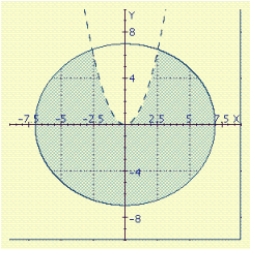
A)
B)
C)
D)
E)

A)

B)

C)

D)

E)


Unlock Deck
Unlock for access to all 147 flashcards in this deck.
Unlock Deck
k this deck
61
Find the maximum and minimum values of the objective function  on the region in the figure.
on the region in the figure. 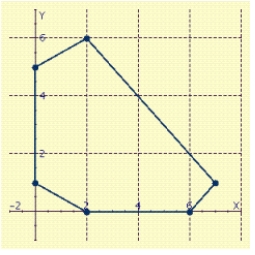
A)The maximum is at
at
 ,
,
The minimum is
 at
at
 .
.
B)The maximum is at
at
 ,
,
The minimum is
 at
at
 .
.
C)The maximum is at
at
 ,
,
The minimum is
 at
at
 .
.
D)The maximum is at
at
 ,
,
The minimum is
 at
at
 .
.
E)The maximum is at
at
 ,
,
The minimum is
 at
at
 .
.
 on the region in the figure.
on the region in the figure. 
A)The maximum is
 at
at ,
,The minimum is
 at
at .
.B)The maximum is
 at
at ,
,The minimum is
 at
at .
.C)The maximum is
 at
at ,
,The minimum is
 at
at .
.D)The maximum is
 at
at ,
,The minimum is
 at
at .
.E)The maximum is
 at
at ,
,The minimum is
 at
at .
.
Unlock Deck
Unlock for access to all 147 flashcards in this deck.
Unlock Deck
k this deck
62
A manufacturer of tennis rackets makes a profit of $16 on each oversized racket and $10 on each standard racket. To meet dealer demand, daily production of standard rackets should be between 25 and 80, and production of oversized rackets should be between 8 and 33. To maintain high quality, the total number of rackets produced should not exceed 80 per day. How many of each type should be manufactured daily to maximize the profit?
A)47 standard and 8 oversized
B)33 standard and 47 oversized
C)47 standard and 33 oversized
D)25 standard and 8 oversized
E)25 standard and 33 oversized
A)47 standard and 8 oversized
B)33 standard and 47 oversized
C)47 standard and 33 oversized
D)25 standard and 8 oversized
E)25 standard and 33 oversized

Unlock Deck
Unlock for access to all 147 flashcards in this deck.
Unlock Deck
k this deck
63
Three average monthly low temperatures for Detroit are listed in the table. 
Let correspond to January,
correspond to January,  to February, . . . , and
to February, . . . , and  to December. Determine a quadratic function
to December. Determine a quadratic function  that interpolates the data - that is, determine the constants a, b, and c such that
that interpolates the data - that is, determine the constants a, b, and c such that  , and
, and  .
.
A)
B)
C)
D)
E)

Let
 correspond to January,
correspond to January,  to February, . . . , and
to February, . . . , and  to December. Determine a quadratic function
to December. Determine a quadratic function  that interpolates the data - that is, determine the constants a, b, and c such that
that interpolates the data - that is, determine the constants a, b, and c such that  , and
, and  .
.A)

B)

C)

D)

E)


Unlock Deck
Unlock for access to all 147 flashcards in this deck.
Unlock Deck
k this deck
64
Find the inverse of the matrix if it exists. 
A)
B)
C)
D)
E)Does not exist

A)

B)

C)

D)

E)Does not exist

Unlock Deck
Unlock for access to all 147 flashcards in this deck.
Unlock Deck
k this deck
65
A hospital dietician wishes to prepare a corn-squash vegetable dish that will provide at least  grams of protein and cost no more than
grams of protein and cost no more than  cents per serving. An ounce of creamed corn provides
cents per serving. An ounce of creamed corn provides  gram of protein and costs
gram of protein and costs  cents. An ounce of squash supplies
cents. An ounce of squash supplies  gram of protein and costs
gram of protein and costs  cents. For taste, there must be at least
cents. For taste, there must be at least  ounces of corn and at least as much squash as corn. It is important to keep the total number of ounces in a serving as small as possible. Find the combination of corn and squash that will minimize the amount of ingredients used per serving.
ounces of corn and at least as much squash as corn. It is important to keep the total number of ounces in a serving as small as possible. Find the combination of corn and squash that will minimize the amount of ingredients used per serving.
A) ounces of corn and
ounces of corn and  ounces of squash
ounces of squash
B) ounces of corn and
ounces of corn and  ounces of squash
ounces of squash
C) ounces of corn and
ounces of corn and  ounces of squash
ounces of squash
D) ounces of corn and
ounces of corn and  ounces of squash
ounces of squash
E) ounces of corn and
ounces of corn and  ounces of squash
ounces of squash
 grams of protein and cost no more than
grams of protein and cost no more than  cents per serving. An ounce of creamed corn provides
cents per serving. An ounce of creamed corn provides  gram of protein and costs
gram of protein and costs  cents. An ounce of squash supplies
cents. An ounce of squash supplies  gram of protein and costs
gram of protein and costs  cents. For taste, there must be at least
cents. For taste, there must be at least  ounces of corn and at least as much squash as corn. It is important to keep the total number of ounces in a serving as small as possible. Find the combination of corn and squash that will minimize the amount of ingredients used per serving.
ounces of corn and at least as much squash as corn. It is important to keep the total number of ounces in a serving as small as possible. Find the combination of corn and squash that will minimize the amount of ingredients used per serving.A)
 ounces of corn and
ounces of corn and  ounces of squash
ounces of squashB)
 ounces of corn and
ounces of corn and  ounces of squash
ounces of squashC)
 ounces of corn and
ounces of corn and  ounces of squash
ounces of squashD)
 ounces of corn and
ounces of corn and  ounces of squash
ounces of squashE)
 ounces of corn and
ounces of corn and  ounces of squash
ounces of squash
Unlock Deck
Unlock for access to all 147 flashcards in this deck.
Unlock Deck
k this deck
66
Find the determinant. 
A)
B)
C)
D)
E)

A)

B)

C)

D)

E)


Unlock Deck
Unlock for access to all 147 flashcards in this deck.
Unlock Deck
k this deck
67
Find the inverse of the matrix if it exists. 
A)
B)
C)
D)
E)Does not exist

A)

B)

C)

D)

E)Does not exist

Unlock Deck
Unlock for access to all 147 flashcards in this deck.
Unlock Deck
k this deck
68
Solve the system  using the inverse method.
using the inverse method.
A)
B)
C)
D)The system is inconsistent
E)The equations are dependent
 using the inverse method.
using the inverse method.A)

B)

C)

D)The system is inconsistent
E)The equations are dependent

Unlock Deck
Unlock for access to all 147 flashcards in this deck.
Unlock Deck
k this deck
69
Solve the system using the inverse method. 
A)
B)
C)
D)The system is inconsistent.
E)The equations are dependent.

A)

B)

C)

D)The system is inconsistent.
E)The equations are dependent.

Unlock Deck
Unlock for access to all 147 flashcards in this deck.
Unlock Deck
k this deck
70
Solve the system  using the inverse method.
using the inverse method.
A)
B)
C)
D)The system is inconsistent
E)The equations are dependent
 using the inverse method.
using the inverse method.A)

B)

C)

D)The system is inconsistent
E)The equations are dependent

Unlock Deck
Unlock for access to all 147 flashcards in this deck.
Unlock Deck
k this deck
71
Let  be the identity matrix of order 2, and let
be the identity matrix of order 2, and let  . Find the polynomial
. Find the polynomial  for the given matrix A. (In the study of matrices,
for the given matrix A. (In the study of matrices,  is the characteristic polynomial of A, and the zeros of
is the characteristic polynomial of A, and the zeros of  are the characteristic values (eigenvalues) of A.)
are the characteristic values (eigenvalues) of A.) 
A)
B)
C)
D)
E)
 be the identity matrix of order 2, and let
be the identity matrix of order 2, and let  . Find the polynomial
. Find the polynomial  for the given matrix A. (In the study of matrices,
for the given matrix A. (In the study of matrices,  is the characteristic polynomial of A, and the zeros of
is the characteristic polynomial of A, and the zeros of  are the characteristic values (eigenvalues) of A.)
are the characteristic values (eigenvalues) of A.) 
A)

B)

C)

D)

E)


Unlock Deck
Unlock for access to all 147 flashcards in this deck.
Unlock Deck
k this deck
72
Sketch the graph of the inequality. 
A)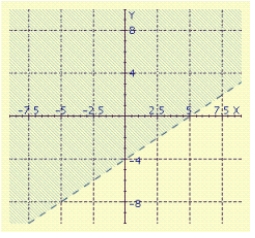
B)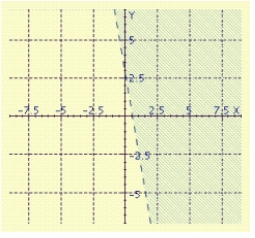
C)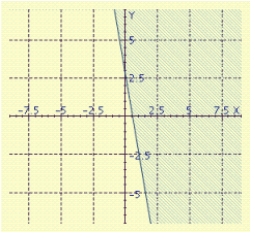
D)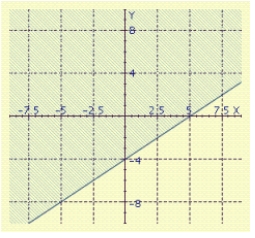
E)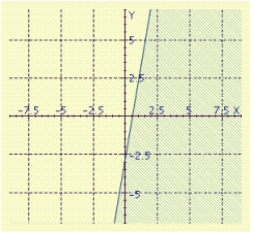

A)

B)

C)

D)

E)


Unlock Deck
Unlock for access to all 147 flashcards in this deck.
Unlock Deck
k this deck
73
Use Cramer's rule, whenever possible, to solve the system. 
A)
B)
C)
D)The equations are dependent.
E)The system is inconsistent.

A)

B)

C)

D)The equations are dependent.
E)The system is inconsistent.

Unlock Deck
Unlock for access to all 147 flashcards in this deck.
Unlock Deck
k this deck
74
The data in the table are generated by the function  . Approximate the unknown constants a and b to four decimal places. x
. Approximate the unknown constants a and b to four decimal places. x
1 2 3 4
F ( x )
0)67654 0.44668 0.29492 0.19472
A)
B)
C)
D)
E)
 . Approximate the unknown constants a and b to four decimal places. x
. Approximate the unknown constants a and b to four decimal places. x1 2 3 4
F ( x )
0)67654 0.44668 0.29492 0.19472
A)

B)

C)

D)

E)


Unlock Deck
Unlock for access to all 147 flashcards in this deck.
Unlock Deck
k this deck
75
Use the method of substitution to solve the system. 
A)( - 1, -12 ), ( 8, 68 )
B)( 9, 68 )
C)( - 1, -12 )
D)( - 1, -12 ), ( 9, 68 )
E)no solution

A)( - 1, -12 ), ( 8, 68 )
B)( 9, 68 )
C)( - 1, -12 )
D)( - 1, -12 ), ( 9, 68 )
E)no solution

Unlock Deck
Unlock for access to all 147 flashcards in this deck.
Unlock Deck
k this deck
76
Find the values of b such that the system  has no solution.
has no solution.
A)
B)
C)
D)
E)no solution
 has no solution.
has no solution.A)

B)

C)

D)

E)no solution

Unlock Deck
Unlock for access to all 147 flashcards in this deck.
Unlock Deck
k this deck
77
Use matrices to solve the system. 
A)
B)
C)
D)The system is inconsistent
E)The equations are dependent

A)

B)

C)

D)The system is inconsistent
E)The equations are dependent

Unlock Deck
Unlock for access to all 147 flashcards in this deck.
Unlock Deck
k this deck
78
Solve the system  using the inverse method.
using the inverse method.
A)
B)
C)
D)The system is inconsistent
E)The equations are dependent
 using the inverse method.
using the inverse method.A)

B)

C)

D)The system is inconsistent
E)The equations are dependent

Unlock Deck
Unlock for access to all 147 flashcards in this deck.
Unlock Deck
k this deck
79
Find the determinant of the matrix. 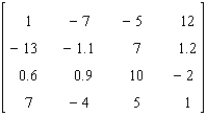
A)721.50
B)7,575.75
C)2,525.25
D)10,101
E)5,050.5

A)721.50
B)7,575.75
C)2,525.25
D)10,101
E)5,050.5

Unlock Deck
Unlock for access to all 147 flashcards in this deck.
Unlock Deck
k this deck
80
Find the inverse of the matrix if it exists. 
A)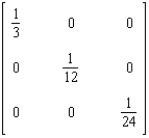
B)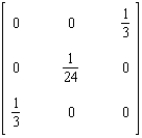
C)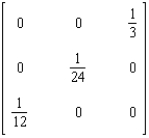
D)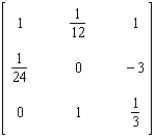
E)Does not exist

A)

B)

C)

D)

E)Does not exist

Unlock Deck
Unlock for access to all 147 flashcards in this deck.
Unlock Deck
k this deck


